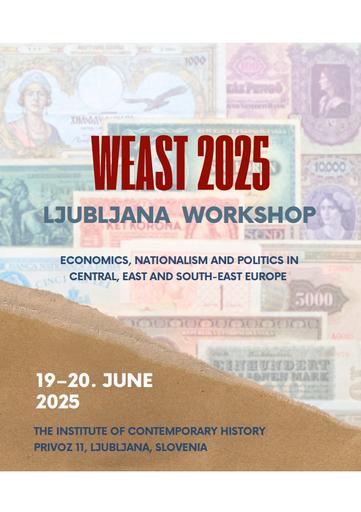/
Dogodki
/
Konference
The issue of Bulgarian railway constructions in the 1880s
Foreign concessions and national aspirations


To delo avtorja Katalin Schrek je ponujeno pod Creative Commons Priznanje avtorstva-Nekomercialno-Deljenje pod enakimi pogoji 4.0 Mednarodna
Datoteke (1)
Opis
In the aftermath of the Berlin Congress, the Balkan nation-states were faced with the significant challenge of reassessing their economic orientations. The options available to them were significantly influenced by the foreign policy behaviour of the surrounding powers (e.g. Austria-Hungary and Russia) and their efforts to gain economic influence in the region. At the same time, there was a growing interest in investment in transport and infrastructure. The Monarchy and Russia had different ideas about the construction of railways in the Balkans. These alternatives reflected each state’s pursuit of its own geopolitical and economic interests. At the same time, in order to represent national interests, the Balkan states felt the need to regulate foreign railway concessions and coordinate the construction of lines at national level. Bulgaria, with its efforts to establish autonomy and control foreign economic influence, is a good example of such a situation. The railway was not only a means of transport, but also played a symbolic role in encouraging Bulgarian national identity and the Railways Act of 1885 laid the foundations for state ownership of the local railways. The dispute over the construction of the Bulgarian railway lines and the ownership of the existing lines began in the second half of the 1880s. One of the flashpoints was a minor incident in 1888, which gave the Stambolov government the impetus to nationalise the Bellova-Vakarel line connecting the Bulgarian territories with Eastern Rumelia, opening up a series of political, diplomatic and economic disputes with this long-term strategy. The present proposal – based on unpublished archive materials (HHStA), ego-documents of Austro-Hungarian diplomats and published Bulgarian sources – will contribute to understand the particular (Bulgarian) aspect of economic nationalism in the processes of nation-building, while reflecting on the reaction of the surrounding powers to the political and economic steps taken by Bulgaria.
Metapodatki (12)
- identifikatorhttps://hdl.handle.net/11686/71102
- naslov
- The issue of Bulgarian railway constructions in the 1880s
- Foreign concessions and national aspirations
- avtor
- Katalin Schrek
- soavtor
- Ivan Smiljanić (mod.)
- predmet
- Bolgarija
- železnice
- 19.st.
- nacionalizem
- opis
- In the aftermath of the Berlin Congress, the Balkan nation-states were faced with the significant challenge of reassessing their economic orientations. The options available to them were significantly influenced by the foreign policy behaviour of the surrounding powers (e.g. Austria-Hungary and Russia) and their efforts to gain economic influence in the region. At the same time, there was a growing interest in investment in transport and infrastructure. The Monarchy and Russia had different ideas about the construction of railways in the Balkans. These alternatives reflected each state’s pursuit of its own geopolitical and economic interests. At the same time, in order to represent national interests, the Balkan states felt the need to regulate foreign railway concessions and coordinate the construction of lines at national level. Bulgaria, with its efforts to establish autonomy and control foreign economic influence, is a good example of such a situation. The railway was not only a means of transport, but also played a symbolic role in encouraging Bulgarian national identity and the Railways Act of 1885 laid the foundations for state ownership of the local railways. The dispute over the construction of the Bulgarian railway lines and the ownership of the existing lines began in the second half of the 1880s. One of the flashpoints was a minor incident in 1888, which gave the Stambolov government the impetus to nationalise the Bellova-Vakarel line connecting the Bulgarian territories with Eastern Rumelia, opening up a series of political, diplomatic and economic disputes with this long-term strategy. The present proposal – based on unpublished archive materials (HHStA), ego-documents of Austro-Hungarian diplomats and published Bulgarian sources – will contribute to understand the particular (Bulgarian) aspect of economic nationalism in the processes of nation-building, while reflecting on the reaction of the surrounding powers to the political and economic steps taken by Bulgaria.
- založnik
- Inštitut za novejšo zgodovino
- datum
- 19. 06. 2025
- tip
- video
- jezik
- Angleščina
- jeDelOd
- pravice
- licenca: ccByNcSa
